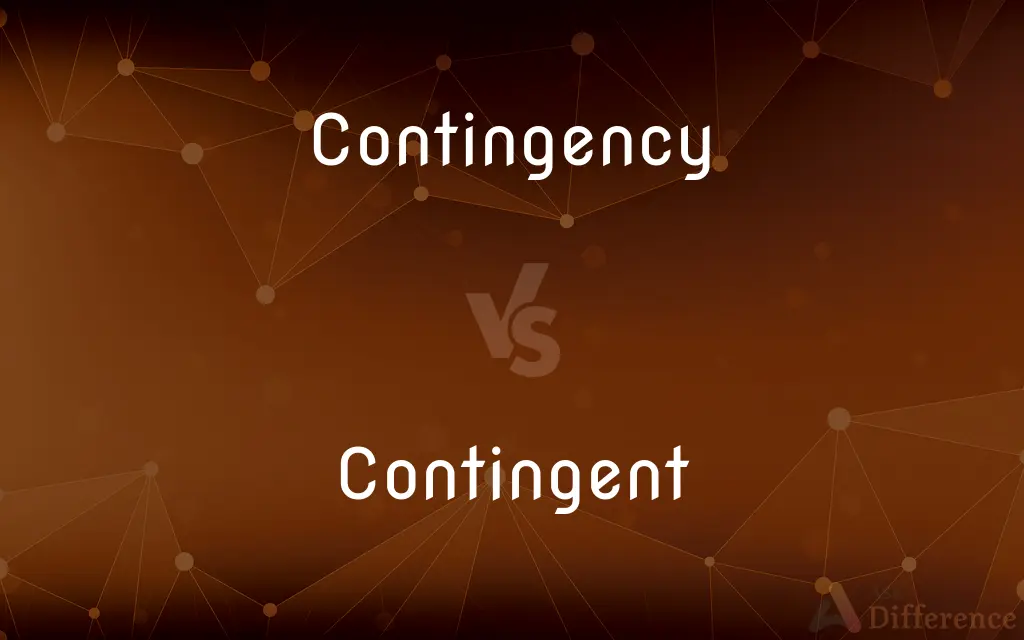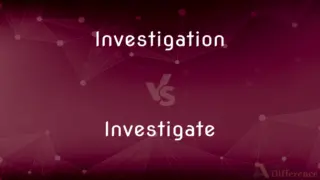Contingency vs. Contingent — What's the Difference?
By Fiza Rafique & Urooj Arif — Updated on April 24, 2024
Contingency refers to a future event that might occur, focusing on conditions or scenarios; whereas contingent describes something dependent on or conditioned by another.

Difference Between Contingency and Contingent
Table of Contents
ADVERTISEMENT
Key Differences
Contingency is a noun that denotes a possible event or condition that could occur in the future, often used in the context of planning and strategy. On the other hand, contingent is an adjective that describes something as conditional or dependent on something else, highlighting uncertainty or dependence in various situations.
Contingency plans are developed to address uncertainties in projects or operations, ensuring preparedness for various outcomes. Whereas contingent outcomes or elements in a project depend on specific conditions being met, indicating a more reactive approach.
In legal terms, a contingency might refer to an event that must occur before a contract becomes binding. On the other hand, contingent liabilities in finance are potential liabilities that may occur depending on the outcome of a future event.
The concept of contingency is often used in philosophy to discuss events that are not necessarily determined by prior states. In contrast, contingent truths or properties in philosophy refer to those that could have been different, depending on external conditions or contexts.
In everyday usage, people talk about making contingency plans for important events like weddings or outdoor functions, reflecting a proactive management of possible future scenarios. Whereas they might describe their attendance as contingent upon certain factors, like weather or health, indicating their participation depends on these factors.
ADVERTISEMENT
Comparison Chart
Part of Speech
Noun
Adjective
Definition
A future event or scenario that may occur
Dependent on or conditioned by another factor
Usage in Planning
Used to refer to alternate plans for different scenarios
Describes conditions or variables within plans
Contexts of Use
Business, strategy, philosophy
Business, legal, everyday language
Example of Use
Contingency plans for emergencies
Contingent on weather conditions
Compare with Definitions
Contingency
An incident or situation that depends on the occurrence of another.
The deal is subject to several important contingencies.
Contingent
Subject to chance.
The project’s success is contingent upon timely completion of each phase.
Contingency
A future event or circumstance that is possible but cannot be predicted with certainty.
They set aside a fund for financial contingencies.
Contingent
Occurring or existing only if (certain circumstances) are the case; dependent on.
His final decision is contingent on the board’s approval.
Contingency
A provision for an unforeseen event or circumstance.
There are several contingencies built into the business plan.
Contingent
Dependent for effect on something that may or may not occur.
The job offer was contingent on the completion of her degree.
Contingency
Something that does not follow necessarily from anything else.
The philosopher argued about the contingency of human existence.
Contingent
True under certain conditions, but not necessarily or universally so.
His argument was based on contingent truths of the scenario.
Contingency
The state of being contingent.
His acceptance of the job offer was in contingency upon salary negotiations.
Contingent
Possible but not assured; uncertain.
The contingent nature of the agreement worried some members.
Contingency
A future event or circumstance which is possible but cannot be predicted with certainty
A detailed contract which attempts to provide for all possible contingencies
Contingent
Subject to chance
The contingent nature of the job
Contingency
An event that may occur but that is not likely or intended; a possibility.
Contingent
Occurring or existing only if (certain circumstances) are the case; dependent on
His fees were contingent on the success of his search
Contingency
A possibility that must be prepared for; a future emergency.
Contingent
A group of people sharing a common feature, forming part of a larger group
A contingent of Japanese businessmen attending a conference
Contingency
The condition of being dependent on chance; uncertainty.
Contingent
Liable but not certain to occur; possible
"All salaries are reckoned on contingent as well as on actual services" (Ralph Waldo Emerson).
Contingency
Something incidental to something else.
Contingent
Dependent on other conditions or circumstances; conditional
Arms sales contingent on the approval of Congress.
Contingency
(uncountable) The quality of being contingent, of happening by chance.
Contingent
Happening by or subject to chance or accident; unpredictable
Contingent developments that jeopardized the negotiations.
Contingency
(countable) A possibility; something which may or may not happen. A chance occurrence, especially in finance, unexpected expenses.
Contingent
(Logic) True only under certain conditions; not necessarily or universally true
A contingent proposition.
Contingency
An amount of money which a party to a contract has to pay to the other party (usually the supplier of a major project to the client) if he or she does not fulfill the contract according to the specification.
Contingent
A group or detachment, as of troops or police, assigned to aid a larger force.
Contingency
A statement which is neither a tautology nor a contradiction.
Contingent
A representative group that is selected from or part of a larger group.
Contingency
Union or connection; the state of touching or contact.
Contingent
An event or condition that is likely but not inevitable.
Contingency
The quality or state of being contingent or casual; the possibility of coming to pass.
Aristotle says we are not to build certain rules on the contingency of human actions.
Contingent
An event which may or may not happen; that which is unforeseen, undetermined, or dependent on something future.
Contingency
An event which may or may not occur; that which is possible or probable; a fortuitous event; a chance.
The remarkable position of the queen rendering her death a most important contingency.
Contingent
That which falls to one in a division or apportionment among a number; a suitable share.
Contingency
An adjunct or accessory.
Contingent
(military) A quota of troops.
Contingency
A certain possible event that may or may not happen, by which, when happening, some particular title may be affected.
Contingent
Possible or liable, but not certain to occur.
Contingency
A possible event or occurrence or result
Contingent
(with upon or on) Dependent on something that is undetermined or unknown, that may or may not occur.
The success of his undertaking is contingent upon events which he cannot control.
A contingent estate
Contingency
The state of being contingent on something
Contingent
Not logically necessarily true or false.
Contingent
Temporary.
Contingent labor
Contingent worker
Contingent
Possible, or liable, but not certain, to occur; incidental; casual.
Weighing so much actual crime against so much contingent advantage.
Contingent
Dependent on that which is undetermined or unknown; as, the success of his undertaking is contingent upon events which he can not control.
Contingent
Dependent for effect on something that may or may not occur; as, a contingent estate.
If a contingent legacy be left to any one when he attains, or if he attains, the age of twenty-one.
Contingent
An event which may or may not happen; that which is unforeseen, undetermined, or dependent on something future; a contingency.
His understanding could almost pierce into future contingents.
Contingent
That which falls to one in a division or apportionment among a number; a suitable share; proportion; esp., a quota of troops.
From the Alps to the border of Flanders, contingents were required . . . 200,000 men were in arms.
Contingent
A gathering of persons representative of some larger group;
Each nation sent a contingent of athletes to the Olympics
Contingent
A temporary military unit;
The peace-keeping force includes one British contingent
Contingent
Possible but not certain to occur;
They had to plan for contingent expenses
Contingent
Determined by conditions or circumstances not yet established;
Arms sales contingent on the approval of congress
Contingent
Uncertain because of uncontrollable circumstances;
The results of confession were not contingent, they were certain
Common Curiosities
Can something be both contingent and a contingency?
Yes, an event can be both contingent (dependent on certain conditions) and a contingency (a potential future scenario).
Are all contingencies negative?
Not necessarily; contingencies can be neutral or even positive, depending on the nature of the event and the context in which it is considered.
What does it mean when a job offer is contingent?
It means the job offer depends on certain conditions being met, such as passing a background check or obtaining a specific certification.
What is a contingent liability?
A contingent liability is a potential financial obligation that will only become an actual liability if a specific, uncertain event occurs.
How do contingencies affect decision-making?
Contingencies introduce elements of uncertainty into decision-making, requiring consideration of different possible outcomes and their implications.
What are contingent assets?
Contingent assets are potential assets that may arise due to a specific future event and are not recognized in financial statements until it is certain they will be received.
How is contingent different from dependent?
Contingent specifically implies a dependency that is conditioned by other factors, typically uncertain, whereas dependent may imply a more direct or constant reliance.
What is a contingency plan?
A contingency plan is a strategy designed to take into account future events or circumstances that are possible but cannot be predicted with certainty.
How do I prepare for contingencies in business?
Preparing for contingencies involves identifying potential risks and developing strategies to mitigate these risks, ensuring that alternate plans are in place.
Is contingency planning the same as risk management?
Contingency planning is a part of risk management, focusing specifically on preparing for uncertain future scenarios.
Why is it important to consider contingencies in contracts?
It ensures that all potential variables and conditions are accounted for, protecting the interests of all parties involved.
Can contingencies be planned for in personal life?
Yes, individuals often plan for potential contingencies in personal life, such as by having savings for unexpected expenses.
How do philosophers view contingencies?
Philosophers often discuss contingencies in terms of events or truths that are not necessarily determined by prior states, exploring the nature of possibility and necessity.
How do contingency and contingent relate to each other?
Contingency refers to the scenario or condition itself that is uncertain or dependent on other factors, while contingent describes the nature of dependence or conditionality of an event or outcome.
What is a contingent worker?
A contingent worker is someone whose employment is based on specific terms that are temporary and subject to change, depending on business needs.
Share Your Discovery

Previous Comparison
Investigation vs. Investigate
Next Comparison
Cereal vs. GrainAuthor Spotlight
Written by
Fiza RafiqueFiza Rafique is a skilled content writer at AskDifference.com, where she meticulously refines and enhances written pieces. Drawing from her vast editorial expertise, Fiza ensures clarity, accuracy, and precision in every article. Passionate about language, she continually seeks to elevate the quality of content for readers worldwide.
Co-written by
Urooj ArifUrooj is a skilled content writer at Ask Difference, known for her exceptional ability to simplify complex topics into engaging and informative content. With a passion for research and a flair for clear, concise writing, she consistently delivers articles that resonate with our diverse audience.















































